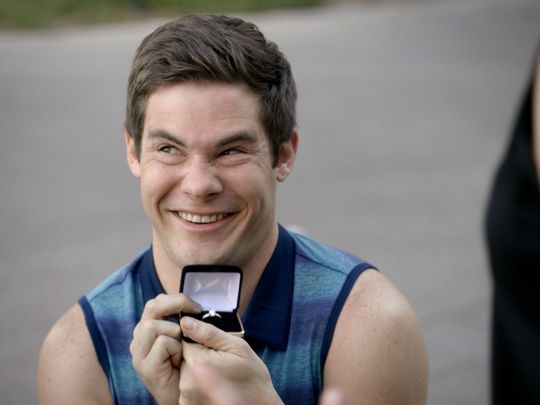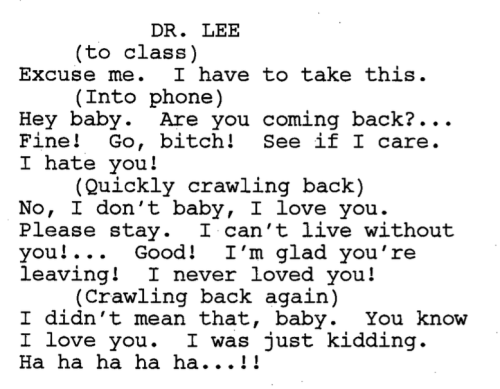Genre: Sci-fi/Comedy
Premise: A couple of loser friends who love video games learn that they’re not only starring in one, but that they’re about to be turned off for good.
About: Today’s script comes from a couple of TV writers who teamed up to sell a spec to WB back in 2008. Danny Zuker would eventually become one of the main staff writers on Modern Family while co-writer Tim Kelleher would manage to get his spec “Grudge Match” through the system back in 2013.
Writers: Danny Zuker and Tim Kelleher
Details: 100 pages 9/20/2008 draft
No matter how many wrinkles Hollywood adds to its well-worn face, no matter how many trends come and go, no matter whether we’re in the Golden Era, Movie Star Era, or Franchise Era, there is one thing that will never go away. The cross-over pitch.
It’s so simple yet so powerful. In order to quickly describe your screenplay, you say it’s a cross between Great Movie A and Great Movie B, and people become instantly excited. It’s so effective that I fall for it every time. If you tell me your script is The Martian meets Silence of the Lambs, I’m going to want to read that!
So buckle my lips and frost my tips when I heard the crossover “Bill and Ted’s Excellent Adventure meets The Matrix.” I mean, like, come on. Is there a better pitch on the planet than that one? Unfortunately, Zuker and his writing partner sold this a couple of years before he hit it big with Modern Family, so the script was sort of forgotten.
Let’s unforget it.
20-something Todd spends most of his time in a virtual reality game with his virtual reality girlfriend, Atheena. But when Atheena dumps Todd by having sex with another avatar right in the middle of a virtual restaurant, Todd’s forced to reevaluate his life.
That may be difficult since his only friend, chubby stoner, Keesh, isn’t exactly winning at life either. The two of them go to the same community college in Tuscon, Arizona, where they try and make sense of their whacked out science professor’s (Dr. Lee) daily rants about quantum physics, most of which he seems to have picked up from Quantum Physics for Dummies.
When Keesh miraculously saves a beautiful girl from a falling beam at the mall, he begins an out-of-his-league romance for the ages. But when satellites start falling out of the sky and huge pits of lava begin opening up in the ground, it’s clear that the universe doesn’t agree with this hook-up.
Soon after, Todd is transported to Planet Doosh, where four Dooshans explain to him that his entire reality is a lie. He’s the only thing that’s real while everything he sees and everyone he knows is a simulation. He’s also told that if he doesn’t stop Keesh and Emma from having sex, that the simulated world he lives in will implode. It will literally be game over.
So back to earth Todd goes, where he’ll have to break the bad news to Keesh. But will Keesh believe him? And even if he does, will he care?
The crossover pitch here is pretty accurate, although I’d throw in two more elements. “Judd Apatow and Kevin Smith present Bill and Ted’s Excellent Adventure meets The Matrix.” If you’re a fan of any of these entities, there’s a good chance you’ll like this.
I enjoyed Control-Alt-Delete’s entire first act, especially the dialogue. Keesh was great, but my favorite was easily community college professor, Dr. Lee, who spends half the movie running around in a kimono. During the script’s first classroom scene, Dr. Lee stops teaching to take a phone call in front of everyone…
When all Kelleher and Zuker had to deal with was the interactions between the characters, everything about Control-Alt-Delete flowed and was hilarious. But once Todd gets called up to Doosh and the creators give him his goal to save the world, something about the script stopped working.
I occasionally see this happen in screenwriting, particularly in comedy scripts. When the writers are allowed to free-flow and have fun with the characters, the writing’s hilarious. But the second that big bad plot comes around (and by “plot” I mean the central goal, stakes, and time constraint), it destroys much of that freedom.
They so feel the need to keep the plot on track that the scenes become too tight, which is detrimental to comedy, where you need the freedom to play around in scenes. It’s all a balancing act, of course, and I see it happen the other way as well, where writers get TOO loosey-goosey in their scenes, to the point where it feels like the party ended 2 hours ago and they’re still looking for another beer.
You could argue Blade Runner 2049 did this – lingered in many of its scenes for too long. But Control-Alt-Delete definitely got less funny once the plot kicked in. And the solution to this is to remember that as long as the scene has a clear purpose, you can still have fun inside that scene. Comedy provides a little more leniency in that area than the other genres as long as you’re funny.
Speaking of the plot, I don’t think Kelleher and Zuker maximized its potential. Specifically, it was a curious choice to have Todd trying to stop his best friend as opposed to a proper villain. Todd had easy access to Keesh. Keesh is going to listen to whatever he has to say. Yeah, he’s got to convince Keesh not to have sex with the girl of his dreams. But this was a relatively easy task to save the world.
Look guys – what you’re always trying to do in screenwriting is make things as hard as possible for your hero. The goal should seem IMPOSSIBLE. Not kind of difficult. But impossible. And all the little tasks along the way should be hard as hell too.
There are some comedy writers out there who are anti-villain and I don’t get it. I think that’s beyond stupid. Villains often become some of the most memorable characters in comedies. That’s because comedy is one of the few genres where you can actually play around with and have fun with the villains. You’re not restricted to just writing a really mean guy. Mugatu, Vizzini, Shooter McGavin, Lumbergh, Principle Rooney. Imagine all those classic movies without those characters. Going without a villain in your comedy is like choosing not to add cheese to pizza. It’s bizarre logic.
The sci-fi comedy genre has lost its way. Its golden age was the 80s. Since then, nobody knows how to write it anymore. It requires not only an understanding of science-fiction and comedy, but also just the right dose of cheesiness. I’ve also found that people who write in this genre write sloppily. They have this attitude that as long as the script approximates what it’s setting out to do, that’s good enough. I’m sorry but that’s not good enough. If you love this genre, like I do, you should strive for greatness. The last 40 pages of this script are messier than a hoarder’s kitchen. And that’s too bad. Because I thought this script had a lot of potential.
Script link: Control-Alt-Delete
[ ] What the hell did I just read?
[x] wasn’t for me
[ ] worth the read
[ ] impressive
[ ] genius
What I learned: Usually, when I randomly ask someone what their script is about, they’ll start talking, and explaining, and back-tracking to remind me of something, before asking me where they left off, before repeating some stuff, before continuing to explain. It can get bad fast. If you’re not ready to pitch your entire idea, have a one-sentence synopsis and a 2-movie crossover pitch ready to go instead. So, for example, with Edge of Tomorrow, you’d say, “It’s about a guy who gets stuck in a time loop fending off the same alien invasion over and over again. It’s Groundhog Day meets War of the Worlds.”



